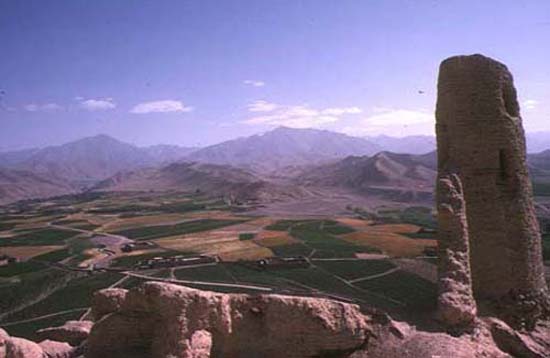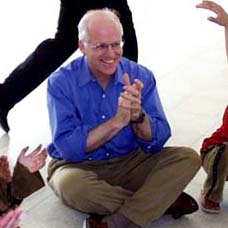2006.08.27: August 27, 2006: Headlines: COS - Pakistan: COS - Afghanistan: COS - Morocco: Journalism: Newsday: James Rupert writes: Pakistan's ruling army is forging a peace deal with Islamic militant guerrillas in the country's border region that will likely free the militants to increase attacks on U.S. forces in Afghanistan
Peace Corps Online:
Directory:
Pakistan:
Peace Corps Pakistan :
The Peace Corps in Pakistan:
2006.08.27: August 27, 2006: Headlines: COS - Pakistan: COS - Afghanistan: COS - Morocco: Journalism: Newsday: James Rupert writes: Pakistan's ruling army is forging a peace deal with Islamic militant guerrillas in the country's border region that will likely free the militants to increase attacks on U.S. forces in Afghanistan
James Rupert writes: Pakistan's ruling army is forging a peace deal with Islamic militant guerrillas in the country's border region that will likely free the militants to increase attacks on U.S. forces in Afghanistan

"Pakistani newspapers say the army is close to a deal with locally based Taliban in the rugged border area of North Waziristan - the latest sign that a 2 1/2-year campaign to oust the militants from Waziristan has failed. The militants, mostly local, ethnic Pashtun tribesmen allied with an unknown number of Arab, Uzbek and other foreign fighters, effectively control North Waziristan, say residents of the region." Journalist James Rupert, head of Newsday's international bureau in Islamabad, Pakistan began his career abroad as a Peace Corps volunteer, teaching mechanics and welding in Morocco.
James Rupert writes: Pakistan's ruling army is forging a peace deal with Islamic militant guerrillas in the country's border region that will likely free the militants to increase attacks on U.S. forces in Afghanistan
Deal may lead to more attacks
Agreement being forged in Afghanistan may mean Islamic militants will increase assaults on U.S. forces
BY JAMES RUPERT
Newsday Staff Correspondent
August 27, 2006
PESHAWAR, Pakistan -- Pakistan's ruling army is forging a peace deal with Islamic militant guerrillas in the country's border region that will likely free the militants to increase attacks on U.S. forces in Afghanistan, sources close to the talks say.
Pakistani newspapers say the army is close to a deal with locally based Taliban in the rugged border area of North Waziristan - the latest sign that a 2 1/2-year campaign to oust the militants from Waziristan has failed. The militants, mostly local, ethnic Pashtun tribesmen allied with an unknown number of Arab, Uzbek and other foreign fighters, effectively control North Waziristan, say residents of the region.
Taliban part of negotiations
Waziristan's militants fight alongside the Taliban movement in Afghanistan. Since signing a preliminary truce last month, North Waziristan's Taliban have been negotiating a deal that will leave them in significant control in the region.
The government has rejected a Taliban demand that the army withdraw completely from North Waziristan, the daily newspaper Dawn reported. But a tribal leader with knowledge of the talks said the government has conceded real control, notably by agreeing that border posts will be manned not by the army, but by tribal paramilitaries over whom the government exercises less control. Army checkpoints established in recent years to tighten the government's hold over the region are to be abandoned, according to an Urdu-language paper, the Daily Express.
Even in North Waziristan's seat of government, the town of Miranshah, "the Taliban are the ones controlling life and setting the rules," the tribal leader said. "Now the army is accepting that this will continue in the future." He asked not to be named, saying he would be sanctioned for discussing the negotiations with a journalist.
The peace deal likely will call for, but will have no way to enforce, the departure of Arab, Uzbek, Chechen and other foreign militants from North Waziristan, the tribal leader and the Daily Express said. Significant but uncounted communities of Arabs and Uzbeks, for example, are based among villages in the Mir Ali district, east of Miranshah.
The planned peace deal will parallel the one the army signed with local Taliban in South Waziristan last year. It marks Pakistan's abandonment of a 29-month-old military campaign - launched under U.S. pressure - that has failed to oust the Taliban from Waziristan.
Previous policies faulted
Authorities "acknowledged the failings in the previous policy" and judged that "a more political approach is needed," said Talat Masood, a retired Pakistani general who is a prominent political analyst in Islamabad, the capital.
With the regular Pakistani army's failure, the United States has been working to build up Pakistan's special forces for counterterrorism work. And senior Bush administration officials are pushing to send tens of millions of dollars for new development projects in Pakistan's border region, a western diplomat said. U.S officials hope that would create jobs for some of the hundreds of thousands of idle young men who are the Taliban's easiest recruits.
In 2001, when U.S. forces ousted the Afghan Taliban regime and its al-Qaida allies, hundreds of Islamic militants fled into Waziristan and Pakistan's other frontier areas. In Pakistan's border "tribal zone," which is isolated, impoverished and dominated by Pashtun tribes that are controlled only loosely by the Pakistani government - the foreign militants helped build local Taliban movements. They used the zone to launch a stubborn insurgency against the U.S.-backed government in Afghanistan.
Under pressure from U.S.
Gen. John Abizaid, who oversees U.S. forces in Afghanistan as commander of U.S. Central Command, stressed the importance yesterday of halting the infiltration of Taliban from their bases in Pakistan.
"It's important that they [Pakistani authorities] don't let the Taliban groups be organized on the Pakistani side of the border," he told journalists.
Under U.S. pressure to stop Taliban infiltration, Pakistani President Pervez Musharraf sent his army into the Pashtun border area in early 2004. But the army's repeated offensives proved so brutal to local villagers that they radicalized residents and pushed them into the arms of the Taliban.
The army has enforced secrecy on its operations in Waziristan, expelling journalists from the region. Thus, the toll of civilians killed, wounded and homeless has gone unmeasured.
In just the first battle of this war over Waziristan, "army and paramilitary troops reportedly evicted between 25,000 and 35,000 civilians" from around a single village, the New York-based group Human Rights Watch reported early this year. "They remained without shelter for the two-week-long operation and returned to find that the army had destroyed scores of homes, cattle, and crops."
The United States has "tried to get ... to work more precisely," relying less on broad attacks and more on special forces raids, an American official said last spring. But a spring offensive around Miranshah yielded no better results.
In Islamabad, "a feeling grew that the previous policy wasn't working, that something new had to be tried," said political analyst Masood.
Quest to oust foreign troops
As in last year's peace talks in South Waziristan, the Taliban have demanded an unfettered right to cross into Afghanistan and pursue what they regard as a jihad against the presence of foreign troops in a Muslim land.
The final deal will contain wording that in theory would bar or limit border crossings, but in reality, it "is sure to leave the Taliban free to cross over [the border] to join the war in Afghanistan," said the tribal leader close to the talks. That would parallel the arrangement in South Waziristan, where militants continue to send fighters into the Afghan war, according to U.S. military officers in Afghanistan.
Pakistan is under pressure from the United States and other countries to halt the Taliban's use of Pakistani borderlands as a sanctuary for their war on U.S. and allied forces in Afghanistan. In the current talks, Pakistan's government has been looking for a formula to make the infiltrations less obvious, said the tribal leader. Government negotiators pressed the Taliban to make their forays into Afghanistan longer but less frequent, he said.
When this story was posted in September 2006, this was on the front page of PCOL:





Peace Corps Online The Independent News Forum serving Returned Peace Corps Volunteers
 | Chris Shays Shifts to Favor an Iraq Timetable
In a policy shift, RPCV Congressman Chris Shays, long a staunch advocate of the Bush administration's position in Iraq, is now proposing a timetable for a withdrawal of American troops. How Mr. Shays came to this change of heart is, he says, a matter of a newfound substantive belief that Iraqis need to be prodded into taking greater control of their own destiny under the country’s newly formed government. As Chairman of the House Government Reform subcommittee on national security, he plans to draft a timetable for a phased withdrawal and then push for its adoption. A conscientious objector during the Vietnam War who said that if drafted he would not serve, Chris Shays has made 14 trips to Iraq and was the first Congressman to enter the country after the war - against the wishes of the Department of Defense. |
 | Peace Corps' Screening and Medical Clearance
The purpose of Peace Corps' screening and medical clearance process is to ensure safe accommodation for applicants and minimize undue risk exposure for volunteers to allow PCVS to complete their service without compromising their entry health status. To further these goals, PCOL has obtained a copy of the Peace Corps Screening Guidelines Manual through the Freedom of Information Act (FOIA) and has posted it in the "Peace Corps Library." Applicants and Medical Professionals (especially those who have already served as volunteers) are urged to review the guidelines and leave their comments and suggestions. Then read the story of one RPCV's journey through medical screening and his suggestions for changes to the process. |
 | Gates charity races to spend billions
Warren E. Buffett’s gift of $31 billion to the Bill and Melinda Gates Foundation means that for tax reasons, starting in 2009, the foundation must distribute $3 billion annually, or a little more than twice what it distributed last year.
PCOL Comment: The Foundation says that "preventing the spread of HIV is the most durable long-term solution to the AIDS epidemic, and a top priority for the foundation." Peace Corps Volunteers and Returned Volunteers have been doing just that in AIDS Education for the past 15 years. Why not consider a $100M annual contribution to the Peace Corps to put 2,500 additional volunteers in the field to expand AIDS education worldwide? |
 | The Peace Corps is "fashionable" again
The LA Times says that "the Peace Corps is booming again and "It's hard to know exactly what's behind the resurgence." PCOL Comment: Since the founding of the Peace Corps 45 years ago, Americans have answered Kennedy's call: "Ask not what your country can do for you--ask what you can do for your country. My fellow citizens of the world: ask not what America will do for you, but what together we can do for the freedom of man." Over 182,000 have served. Another 200,000 have applied and been unable to serve because of lack of Congressional funding. The Peace Corps has never gone out of fashion. It's Congress that hasn't been keeping pace. |
 | Changing the Face of Hunger
In his new book, Former Congressman Tony Hall (RPCV Thailand) says humanitarian aid is the most potent weapon the United States can deploy against terrorism. An evangelical Christian, he is a big believer in faith-based organizations in the fight against hunger. Members of Congress have recently recommended that Hall be appointed special envoy to Sudan to focus on ending the genocide in Darfur. |
 | PC will not return to East Timor in 2006
Volunteers serving in East Timor have safely left the country as a result of the recent civil unrest and government instability. Latest: The Peace Corps has informed us that at this time, the Peace Corps has no plans to re-enter the country in 2006. The Peace Corps recently sent a letter offering eligible volunteers the opportunity to reinstate their service in another country. |
 | Chris Dodd considers run for the White House
Senator Chris Dodd plans to spend the next six to eight months raising money and reaching out to Democrats around the country to gauge his viability as a candidate. Just how far Dodd can go depends largely on his ability to reach Democrats looking for an alternative to Hillary Clinton. PCOL Comment: Dodd served as a Volunteer in the Dominican Republic and has been one of the strongest supporters of the Peace Corps in Congress. |
 | Peace Corps stonewalls on FOIA request
The Ashland Daily Tidings reports that Peace Corps has blocked their request for information on the Volkart case. "After the Tidings requested information pertaining to why Volkart was denied the position — on March 2 — the newspaper received a letter from the Peace Corps FOIA officer stating the requested information was protected under an exemption of the act." The Dayton Daily News had similar problems with FOIA requests for their award winning series on Volunteer Safety and Security. |
 | PCOL readership increases 100%
Monthly readership on "Peace Corps Online" has increased in the past twelve months to 350,000 visitors - over eleven thousand every day - a 100% increase since this time last year. Thanks again, RPCVs and Friends of the Peace Corps, for making PCOL your source of information for the Peace Corps community. And thanks for supporting the Peace Corps Library and History of the Peace Corps. Stay tuned, the best is yet to come. |
 | History of the Peace Corps
PCOL is proud to announce that Phase One of the "History of the Peace Corps" is now available online. This installment includes over 5,000 pages of primary source documents from the archives of the Peace Corps including every issue of "Peace Corps News," "Peace Corps Times," "Peace Corps Volunteer," "Action Update," and every annual report of the Peace Corps to Congress since 1961. "Ask Not" is an ongoing project. Read how you can help. |
 | RPCV admits to abuse while in Peace Corps
Timothy Ronald Obert has pleaded guilty to sexually abusing a minor in Costa Rica while serving there as a Peace Corps volunteer. "The Peace Corps has a zero tolerance policy for misconduct that violates the law or standards of conduct established by the Peace Corps," said Peace Corps Director Gaddi H. Vasquez. Could inadequate screening have been partly to blame? Mr. Obert's resume, which he had submitted to the Peace Corps in support of his application to become a Peace Corps Volunteer, showed that he had repeatedly sought and obtained positions working with underprivileged children. Read what RPCVs have to say about this case. |
 | Why blurring the lines puts PCVs in danger
When the National Call to Service legislation was amended to include Peace Corps in December of 2002, this country had not yet invaded Iraq and was not in prolonged military engagement in the Middle East, as it is now. Read the story of how one volunteer spent three years in captivity from 1976 to 1980 as the hostage of a insurrection group in Colombia in Joanne Marie Roll's op-ed on why this legislation may put soldier/PCVs in the same kind of danger. Latest: Read the ongoing dialog on the subject. |
Read the stories and leave your comments.

Some postings on Peace Corps Online are provided to the individual members of this group without permission of the copyright owner for the non-profit purposes of criticism, comment, education, scholarship, and research under the "Fair Use" provisions of U.S. Government copyright laws and they may not be distributed further without permission of the copyright owner. Peace Corps Online does not vouch for the accuracy of the content of the postings, which is the sole responsibility of the copyright holder.
Story Source: Newsday
This story has been posted in the following forums: : Headlines; COS - Pakistan; COS - Afghanistan; COS - Morocco; Journalism
PCOL34297
04























